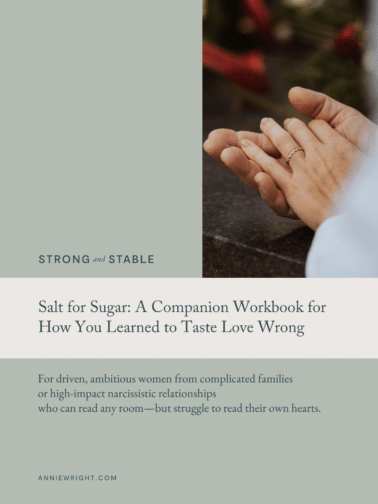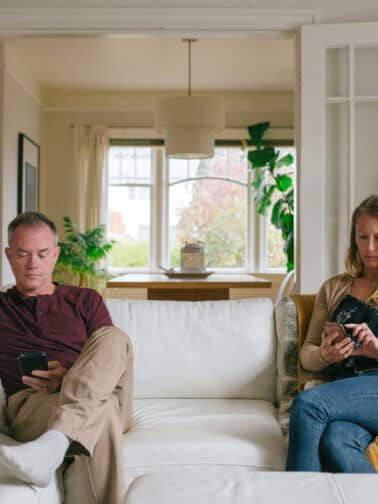My daughter was nearly 4 years old then. We streamed the movie one evening, and I don’t know if I’ve ever felt so seen as when Louisa sang, “I’m the strong one, I’m not nervous. I’m as tough as the crust of the earth is.” She lamented her immense capabilities and how she’d rather not be flexing those capacities all the damn time.
I was so shook that I immediately texted one of my best girlfriends in California.
An exceptional corporate attorney and mom of two. “Have you seen Encanto? Did you listen to this song?” She wrote back in all caps with exclamation points about how this song felt like a love letter written just for us.
She, like me, was the primary breadwinner in her family—working 80-hour weeks. The question that haunted me most from the lyrics: “But wait, if I could shake the crushing weight of expectations, would that free up some room for joy or relaxation or simple pleasure?”
That line about pressure being “drip, drip, drip, ever increasing”—I’ve never related to something so much. The movie came out during a watershed moment for me, when I had decided to sell my therapy center and leave the Bay Area for a quieter life on the New England coast.
I knew the pressure was accumulating too much, and like Louisa, the psychological structure holding up my life was showing signs of strain. What started as economic necessity during the pandemic had evolved into something else entirely—a way for my unresolved childhood trauma to latch onto one last coping pattern.
This is the story of the day my body finally said “no more” to being everyone’s rock, and how I began putting down what was never mine to carry…
I don’t think I was born to be “the strong one.” This identity was carefully constructed over years, brick by brick, expectation by expectation.
Looking back, I can see the early blueprints forming in my childhood. When you grow up in an environment where emotional needs often go unmet, you learn quickly to be self-sufficient. You learn that vulnerability is a luxury you can’t afford. If grownups don’t have their hands on the wheel, you learn that someone needs to hold things together, and if not you, then who?
The full manifestation of this identity took shape during the pandemic. Suddenly, I wasn’t just the emotionally strong one—I became the sole financial provider for my family, which now included a 16-month-old. The economic necessity created the perfect conditions for my unresolved childhood trauma to evolve into a full-blown coping pattern.
Over-functioning and severe workaholism became my default setting. I was running a therapy center that was growing rapidly, seeing a beyond-full clinical caseload, running an online course, publishing regularly, and trying to be present for my family. The lines blurred completely between Annie the person and Annie the provider, Annie the CEO, Annie the therapist, Annie the problem-solver.
The world reinforces this identity at every turn. When you’re good at carrying weight, people hand you more to carry. When you’re known for solving problems, everyone brings you their problems. When you never say no, no one expects you to start.
My professional success became both validation and prison. Each achievement, each media quote, each new client became evidence that this identity was working. Look at what you’ve built! Look at how many people you’re helping! Look at how necessary you are!
What I couldn’t see was how this identity was slowly hollowing me out from the inside. I was so busy being strong for everyone else that I had no idea how to be gentle with myself.
The Weight Becomes Unbearable
Your body always keeps the score, whether you’re listening or not. Mine kept score in increasingly visible ways.
I put on 50 pounds in the five years of growing and running the therapy center. Then came the thyroid cancer—the first in my family with no history of it. The chronic insomnia was laced through all of it, with 2 AM wake-ups being the norm, filled with anxiety about all the things I needed to do, all the people counting on me.
My beloved therapist had been warning me for a long time: “If you don’t slow down, you might end up with a chronic illness or an autoimmune disorder because of how hard you push yourself.” I nodded along during our sessions, acknowledging her wisdom intellectually while believing somehow that I was the exception. That won’t happen to me.
Meanwhile, my marriage was super strained. I was physically present but mentally always at work. I felt like I never had enough time for my daughter, and the guilt was constant, crushing. And time for friends? Forget about it.
The irony wasn’t lost on me: I was a therapist helping others set boundaries and practice self-care while I was running myself into the ground.
On paper, everything looked impressive. I was being quoted in major publications. The therapy center was thriving financially. From the outside looking in, I was a success story.
On paper, everything looked impressive… But inside? I was totally fucking miserable.
I felt like a car driving down the highway at 100 miles an hour with no gas in the tank, running on fumes and sheer determination, knowing that a breakdown was inevitable.

The Day It All Became Too Much
May 2023. I remember it with perfect clarity—the day I couldn’t ignore what my body had been trying to tell me.
It wasn’t one dramatic moment. There was no cinematic breakdown. Instead, it was after yet another night of waking up at 2 AM, heart racing, mind spinning with all the responsibilities waiting for me. It was the fifth night in a row I’d gotten only 4.5 hours of sleep.
That morning, I found myself paralyzed with exhaustion. I couldn’t move. I had no idea how I’d get through the day. My body had simply reached its limit and was refusing to cooperate with my mind’s demands.
I was supposed to be getting ready for work, but instead, I sat at my desk (housed in our 75 sq foot garage along with our washer/dryer, pantry, husband’s tool racks and home gym). I started sobbing. 3 AM and I was sobbing in my garage home office, husband and daughter asleep, super clear I couldn’t continue like this.
In that moment of complete physical shutdown, I heard my therapist’s voice in my head, warning me about the autoimmune disorders that often follow chronic stress. I thought about my daughter, who deserved a mother who was present. I thought about my marriage, strained to the breaking point. I thought about the 50 extra pounds, the thyroid cancer, the insomnia—all the ways my body had been screaming at me to stop.
And for the first time, I listened in a way that took traction. I HAD to make changes.
The fear was overwhelming. What would happen if I stepped back? Would everything I’d built collapse? Would we be okay financially? Would I still be valuable if I wasn’t constantly producing, achieving, solving? Who was I if not the strong one?
But in that moment, an even greater fear emerged—the fear of continuing on this path. I suddenly saw with crystal clarity where it led: to illness, to broken relationships, to a life that looked successful on paper but felt empty in reality.
That day, I knew I needed to change course. Like Louisa in Encanto, the pressure had become too much.
Sometimes the bravest thing isn’t pushing through. Sometimes your growth edge isn’t about continuing and working it through. Sometimes it’s admitting that what you’ve been carrying is crushing you. Sometimes your growth edge is fucking stopping.
I called in sick that day and canceled clients—something I almost never did, maybe the 3rd time in 13 years of clinical work—booked an emergency session with my therapist and had the conversation with my family that would change everything. It was time to make some radical changes, both internal and external.





